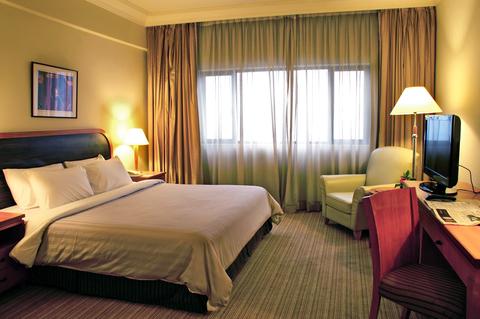

Occasionally, event owners want to handle everything themselves. But sports events, particularly on the youth side, are growing in scope and complexity. Throw in the uncertainties of operating in the post-quarantine reopening phase and many event owners find themselves hesitant about the whole concept of accommodations and arrangements.
Should you decide to work with a housing bureau, a few things will be off your plate. The company should be able to create a custom hotel booking link for your tournament website so that reservations can be made and streamlined online. The housing partner will also handle all hotel questions or reservation changes/special requests that may come up from participants in the process – again, something you won’t have to do. Their system should generate live hotel pick-up/ client revenue and comp room reports which should always be at your disposal. With or without Stay to Play, they can additionally assist with maximizing hotel pickup and participation.
Housing bureaus also have national buying power. Because a housing bureau has long-term business relationships with the different hotel chains and hotel booking volume to back it up, it is easier for them to leverage their brand in order to gain cost-efficient room rates and contract liability free room blocks for traveling teams. This generally helps to grease the hotel contracting gears more than the single planner can. And they can do it all in less time, with far less margin for error.
In addition, a housing company generally has a knowledge of each event’s host city and can head off potential problems or influence a path towards previously discovered success. As an example, if you’re not completely familiar with a city, many hotels can look good on paper (or on their website) – but some might not be great choices for your group depending on different factors. Maybe the neighborhood isn’t as safe or the hotel is harder to access because it’s out of the way or perhaps there is a lot of construction in the area. Other factors include time of year, competing events and hotel occupancy. Your partner will find out all these things in advance and can coordinate with you before you solidify your destination (or afterwards) – rather than it being a bit too late for comfort.
Ultimately, while athletes and their families will absolutely remember who won or who lost a big tournament, they’ll also remember where they stayed. That experience will shape a huge part of their opinion of the organization and may help them decide whether or not to come back in future years. That’s why, increasingly, event owners are choosing to work with housing bureaus; in fact, we rarely see people go back to trying to do it themselves once they see the advantages of integrating a strategic housing partner.
As a quick note: Your housing partner does not need to be located in your host city so it is best not to fall into the sometimes limiting scenario of only considering local groups. Most of the housing companies out there are working with events all over the U.S. (and beyond) and this process is completely virtual. That being said, certain larger events require onsite support and that should be easily accommodated by your housing partner, if needed.
What Do You Need to Do?
Well in advance of your event (one year out or more is ideal but in general, as soon as you select your city and your competition venue), you should be thinking about accommodations.
Contact the housing bureau and discuss the event – the number of teams/participants you expect to be hosting that are traveling in, the location of the venue(s), historical data (if available) including hotel stay patterns or any other particulars, such as the room type preferences between staff, team, athlete, media etc. (rooms with two queen beds are popular with teams, as are suite-style properties which also feature microwaves, fridges, pull-out sofas and other amenities). Specify if you have needs regarding discounted or complimentary rooms for officials, free parking or anything else. These are all common factors and should be already negotiated on your behalf but having all of the details can best help create the selection and end result for your group’s needs.
What is Different These Days?
Breakfast being included in the rate has always been a popular option that athletes and parents have preferred, including breakfast buffets; however, in light of COVID-19, many things have changed. While in many states, buffets have been closed down for the time being, hotels may still offer “grab-and-go” breakfasts, with pre-wrapped muffins, Danish, bagels and bottled juices or waters, or box lunches with a sandwich, fruit and a cookie (or something along those lines). Certain hotels will cater their breakfast exclusively for your event so make sure to specify this in advance.
Something else that has changed is the fact that some hotels, unless requested, have cut down on their daily housekeeping regimen in the interest of keeping down the number of people coming into guest rooms. Some hotels may not offer room service either; however, in-house restaurants may be operating – although they may be limited in their capacity to serve more than a certain number of people at a time (something that could be very important if everyone is trying to eat before they leave for a game). If you will have people who need to eat at a specific time, arrangements should be worked out in advance.
While many hotels still have pools, hot tubs and fitness centers, they may not be operating at the moment. Many hotels have COVID-19 restrictions listed on their websites; however, it is always best to call the property directly in order to get the most up-to-date information or rely on the housing bureau for the current information. After all, if there is one thing we have all learned this year, it’s that situations can be very fluid, and good communication will be necessary in order to stay on top of everything.
What Kinds of Questions Should You Ask a Potential Housing Partner?
If you’ve made the decision to work with a housing service, the next step of the process is narrowing down the list and choosing that partner. But picking a company blindly is no better than picking a hotel without comparing. Here are some pointers:
Get references and check their online reviews: Ask your colleagues about services they have used and do a quick Google search online of the potential company. See what their consumers are saying. Ask the sports commissions if they have recommendations. And if you’re planning to work with a specific service, you can always check the references they provide.
Ask the right questions: Make sure your attendees will be well taken care of by the housing company. For example, if someone has a problem or a question regarding their room or their reservation, who do they call? What happens if they need to change or cancel their reservations? What are the customer service hours? What happens if the person calling is onsite at the tournament but it’s after regular business hours? The right housing partner should have a solution for all of this to make sure your attendees will always be looked after on the hotel side.
Once you’ve found a good housing service to be your partner in this endeavor, it’s time to get the word out to your athletes, friends and families. Again, the more advance notice you give, the better. Remind them that while you have competitive room rates at good properties, early registration/ hotel bookings are the absolute best way of guaranteeing they can get their choice of hotel, at the rate that works best, with the amenities they desire. SDM

